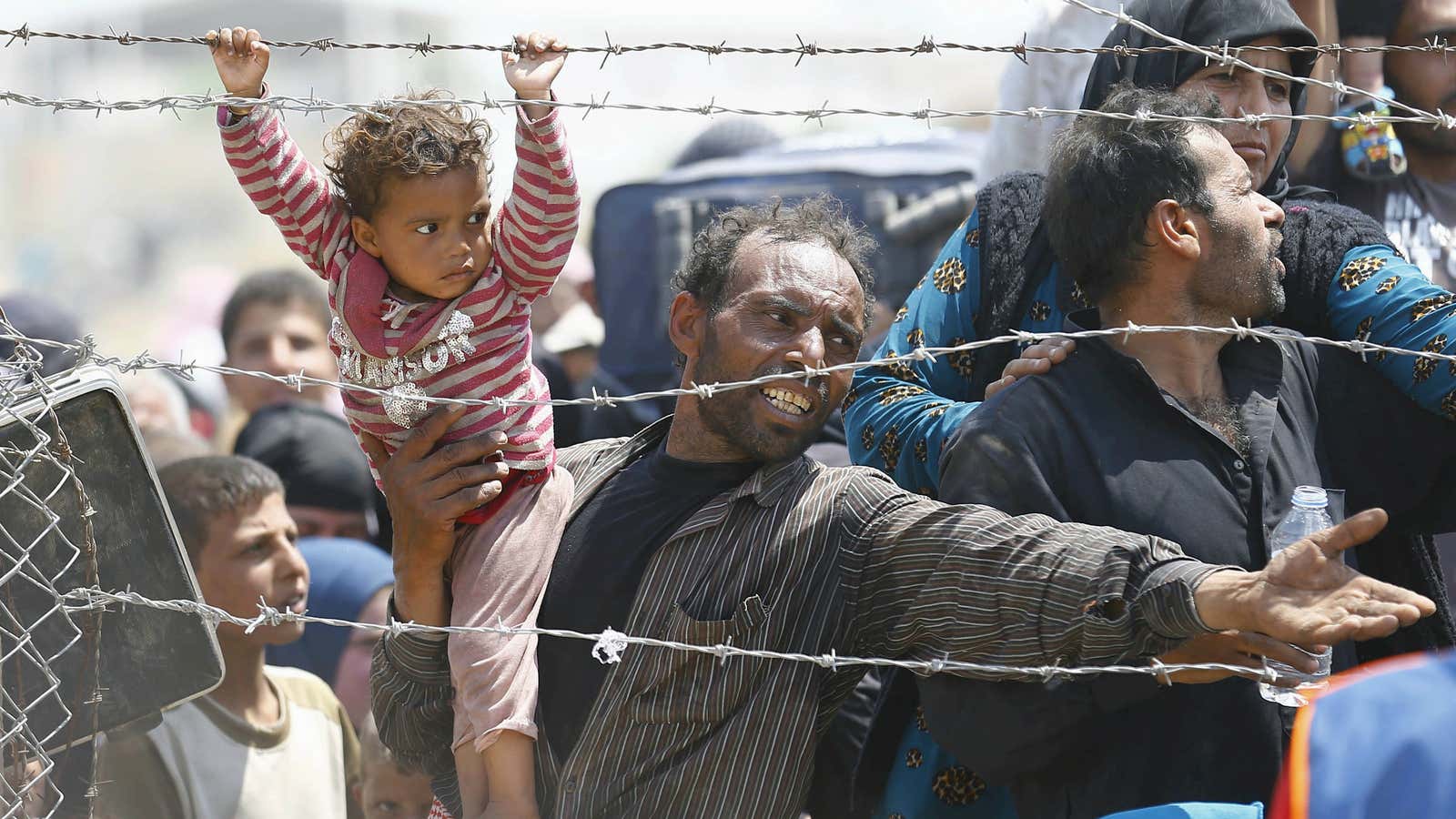Don’t be surprised by political leaders’ indecision over how to help refugees amid the growing crisis in Europe. Even philosophers can’t offer an unanimous answer on the moral response.
Here are just a few of the positions–albeit highly simplified—that philosophers have taken on how wealthy countries should respond to refugees:
Don’t let in any refugees or give aid
Biologist Garrett Hardin came up with one of the most controversial and well-known positions in applied ethics. His “lifeboat ethics” paper argues that wealthy nations, just like lifeboats, have limited capacity and that welcoming additional people would sink the boat. He also maintains that death prevents overpopulation from destroying the planet’s resources, and so there’s no moral duty to provide aid. However, he was in favor of exporting technology to help poorer countries generate their own solutions.
Further reading: Lifeboat ethics (pdf)
Temporarily accept refugees
National cultural identity is important, argues Oxford University philosopher David Miller, and so wealthy states don’t have to accept every migrant. That said, nations do have an obligation to welcome refugees whose basic rights are threatened.
Nations can limit the number of refugees they accept and can also evict refugees once the humanitarian crisis has abated. Miller also says it could be preferable to discourage long-distance migration by sending aid or tackling the cause of the refugee crisis.
Further reading: Immigration: The case for limits (pdf)
Stop worrying about how to “fairly” share the refugee burden
Leslie Green, a philosophy of law professor at Oxford University, has written an essay condemning complaints that the number of refugees hasn’t been “fairly” distributed. (For example, accusations that wealthy Middle Eastern countries aren’t doing their “fair” share, or Hungary saying that this is Germany’s problem.) He explains:
All of these complaints treat fulfilling one’s moral (and legal) duties as an unwelcome burden that is tolerable only if it is shared according to some comparative measure. The fairness-obsessive cares more about the relative burdens on rich countries than he does about the absolute burdens his inaction imposes on those fleeing persecution and destruction.
So, since any wealthy individual country can support refugees regardless of international co-operation, a country that can help refugees must do so–regardless of how other nations behave.
Further reading: The refugee crisis is not about fairness
Take in as many refugees as possible until society begins to break down
Peter Singer is one of the most famous and respected moral philosophers today—who, unfortunately for you, convincingly argues that you’re immoral unless you’re giving a sizeable chunk of your income to charity.
He says that we have the same moral obligation towards strangers living miles away as we do to our closest family, and so every nation should welcome refugees until the cost to that state begins to outweigh the benefits to refugees. Singer recommends doubling national immigration quotas every year, until the country cannot support any more.
Singer has also come up with a practical solution to the current refugee crisis, which takes into account humanity’s xenophobic tendencies by urging wealthy countries to fund refugee camps in less affluent nations.
Further reading: Practical ethics (pdf) and Escaping the refugee crisis
End all national borders
Open-border theory argues that there’s no just reason for closed nation states. Joseph Carens, a political science professor at the University of Toronto, writes:
Citizenship in Western liberal democracies is the modern equivalent to feudal privilege—an inherited status that greatly enhances one’s life chances. Like feudal birthright privileges, restrictive citizenship is hard to justify when one thinks about it closely.
Professor Phil Cole tells Quartz that,“people should have the right to go where they need or want to go.” Destroying national borders would boost global economy and wouldn’t cause serious damage to wealthier nations, he says. “People in general, if they’re not in danger, would like to stay where they are,” adds Cole. “There’s the idea that there would be a catastrophic movement if we had open borders, but I don’t think that would happen.”
